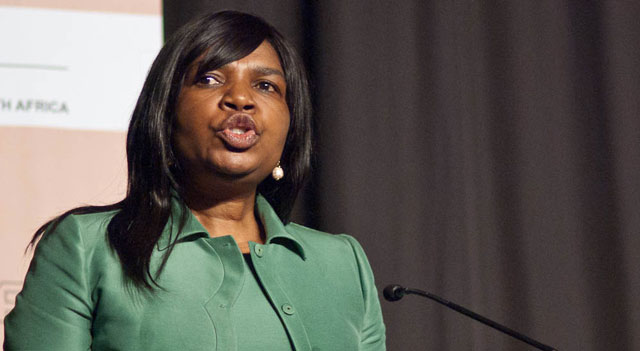
Former communications minister Dina Pule is guilty of most of the charges levelled against her at parliament’s ethics committee and was also found to have lied to the committee during its investigations.
The committee has now recommended that parliament refer the matter to the police and the National Prosecuting Authority.
On Wednesday, the ethics committee said that Pule had been found to be in breach of the code of conduct for members of parliament and would be fined 30 days’ salary. She would also have her parliamentary privileges, including her right to a seat in debates and committees, suspended for 15 days. In addition, she would be reprimanded publicly in the national assembly.
However, committee chairman Ben Turok said the punishment imposed on Pule was inadequate and that parliament’s code of conduct should be changed to make provision for “harsher punishments” where applicable.
Turok said Pule abused her position as communications minister by awarding her romantic partner, businessman Phosane Mngqibisa, funding for overseas trips and contracts.
The committee also found that Pule had lied to it during the hearings and that she had government employees collude with her. “The continued denial of the relationship during the proceedings further reflects the intent to wilfully mislead the panel,” the ethics committee’s report reads.
Turok said a committee panel found that Mngqibisa influenced Pule for an extended period of time, going back to when she was a deputy minister in the presidency.
According to the panel’s report, Pule breached the code of conduct for MPs as she did not disclose the conflict involving Mngqibisa. “In this regard, Pule wilfully provided the registrar with incorrect and misleading details,” it says.
Pule also breached the code’s requirement that MPs must declare private interests when they or a spouse, permanent partner or business partner has a personal or private financial or business interest.
“The panel is satisfied, on the evidence available to it, that Pule did not disclose to Telkom that her permanent companion had a financial interest in the ICT Indaba which Telkom was sponsoring.”
At the centre of the allegations against Pule are that Mngqibisa benefited to the tune of R6m from funds provided by corporate sponsors for the indaba. A forensic report by law firm Werksmans found that Mngqibisa claimed the funds as a “management fee” having received access to the account for the event through its primary organiser, Carol Bouwer, thanks to pressure exerted by Pule.
Pule later claimed an “independent forensic investigation” exonerated her with regard to the ICT Indaba, only for TechCentral to reveal that Mngqibisa commissioned and paid for the report.
“Pule … should not have put herself in a position where she had a conflict of interest,” the report says. “In this matter, there was a clear overlap between Pule’s official duties in her oversight role of Telkom and her facilitation of funding for the ICT Indaba.”
On the allegation that the former minister received a pair of Christian Louboutin shoes as a gift from Mngqibisa, the panel found that there was no breach of the code. “There was not sufficient evidence to prove the allegation.”
However, Pule breached the code by providing the registrar with incorrect or misleading details, specifically denying that Mngqibisa was her permanent companion. “The facts prove otherwise,” the report says. “The evidence proves that Pule, through her conduct, publicly acknowledged Mngqibisa as her long-standing and permanent companion.
This was demonstrated through her admission that she had a relationship of “comradeship and friendship” with him; through her association with him in both the public arena and in her official capacity; sharing hotel accommodation with him; travelling with him on numerous international trips; nominating him as her spouse or companion; and sharing hired cars during official trips, including the exclusive use of one car while the rest of the delegation travelled separately.
“The committee notes that the concealment of the relationship by Pule enabled Mngqibisa to gain improper financial benefit. In particular, Mngqibisa, through Pule’s influence, benefited improperly by receiving R6m for his company and enjoyed the benefit of the [department of communications] paying for his overseas trips and accommodation,” the report says.
“The continued denial of the relationship during the proceedings further reflects the intent to wilfully mislead the panel.”
In addition to the penalties imposed on Pule, the panel has recommended that president Jacob Zuma consider measures to address the relationship between the department of communications and the state-owned enterprises in its portfolio.
The committee is concerned that there are “no appropriate measures in place to ensure that when the [department] raises funds for various activities that this does not impact on its oversight role of the entities it oversees”.
“It is important for the department to be circumspect in the manner in which it approaches industry role players in its sector for funding, to ensure that these approaches do not undermine the role of the department.”
In addition, the committee panel has decided to refer the “lack of cooperation” by communications department officials to the Public Service Commission for further investigation into whether they are guilty of not appearing at its hearing. It also wants to know if the department submitted incomplete information relating to a number of Pule’s trips and why some documents requested by the panel had “disappeared”.
It has also recommended that parliament refer a potential breach of the Powers, Privileges and Immunities of Parliaments and Provincial Legislatures Act to the police and to the National Prosecuting Authority concerning people named in the report who are “alleged to have wilfully furnished a parliamentary committee with misleading information”. — (c) 2013 NewsCentral Media




